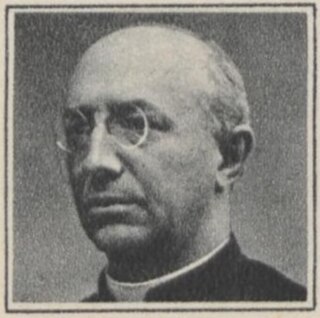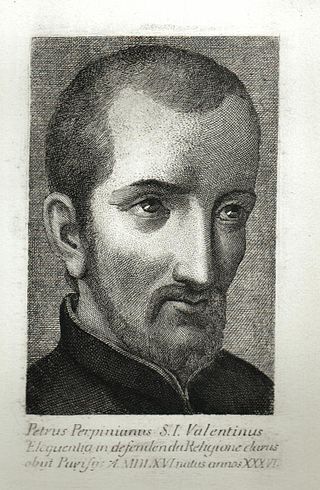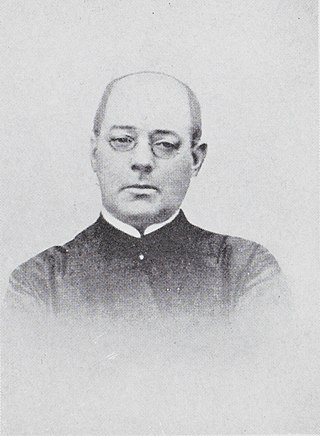
The Society of Jesus, also known as the Jesuit Order or the Jesuits, is a religious order of clerics regular of pontifical right for men in the Catholic Church headquartered in Rome. It was founded in 1540 by Ignatius of Loyola and six companions, with the approval of Pope Paul III. The society is engaged in evangelization and apostolic ministry in 112 nations. Jesuits work in education, research, and cultural pursuits. Jesuits also conduct retreats, minister in hospitals and parishes, sponsor direct social and humanitarian ministries, and promote ecumenical dialogue.

Regimini militantis Ecclesiae was the papal bull promulgated by Pope Paul III on September 27, 1540, which gave a first approval to the Society of Jesus, also known as the Jesuits, but limited the number of its members to sixty.

Friedrich Spee was a German Jesuit priest, professor, and poet, most well known as a forceful opponent of witch trials and one who was an insider writing from the epicenter of the European witch-phobia. Spee argued strongly against the use of torture, and as an eyewitness he gathered a book full of details regarding its cruelty and unreliability. He wrote, "Torture has the power to create witches where none exist."

Claudio Acquaviva, SJ was an Italian Jesuit priest. Elected in 1581 as the fifth Superior General of the Society of Jesus, he has been referred to as the second founder of the Jesuit order.

Jan Philipp Roothaan, SJ was a Dutch Jesuit, elected twenty-first Superior-General of the Society of Jesus.

Antonio Possevino was a Jesuit protagonist of Counter Reformation as a papal diplomat and a Jesuit controversialist, encyclopedist and bibliographer. He was the first Jesuit to visit Muscovy, Sweden, Denmark, Livonia, Hungary, Pomerania, and Saxony in amply documented papal missions between 1578 and 1586 where he championed the enterprising policies of Pope Gregory XIII.

The Classical Gymnasium is a gymnasium high school situated in Zagreb, Croatia. It was founded by the Society of Jesus in 1607. In its first year it had 260 students and it operated on the basis of the Jesuit programme "Ratio atque institutio studiorum societatis Jesu".

Manuel Álvares was a Jesuit educator in Portugal.
The Monumenta Historica Societatis Iesu (MHSI) is a collection of scholarly volumes on critically edited documents on the origin and early years of the Society of Jesus, including the life and writings of St Ignatius of Loyola.
The Jesuit Historical Institute is an international group of Jesuit historians committed since the end of the 19th century to bring out scientifically critical editions of the foundational texts of the Society of Jesus, and to promote research on the history of the Jesuits. Originally based in Madrid, the institute is now quartered in Rome.
Georg Michael Pachtler was a German Jesuit and educational writer.

Miguel Anselmo Azcona Bernad, S.J. was a Filipino Jesuit priest, educator, linguist, critic, academic, historian, author, journalist and editor. Son of Misamis Mayor and Misamis Occidental Governor Don Anselmo Bernad, he entered the Society of Jesus on June 7, 1932 and was ordained March 24, 1946 in the Fordham University Church. He was editor-in-chief of Philippine Studies from 1956 to 1959 and founder of Kinaadman Journal Research Office in 1979.

Cornelius Nicolaas Petrus Wessels was a Dutch Jesuit, known for his historical works on the early Catholic Missions in Central Asia, specially Tibet, and in the East Indies.
Cypriano Soarez y Herrera, S.J. (1524–1593) was a sixteenth-century Spanish Jesuit who wrote De Arte Rhetorica, the first Jesuit rhetoric textbook.

Eloquentia perfecta, a tradition of the Society of Jesus, is a value of Jesuit rhetoric that revolves around cultivating a person as a whole, as one learns to speak and write for the common good. Eloquentia perfecta is a Latin term which means "perfect eloquence". The term connotes values of eloquent expression and action for the common good. For Jesuits, the term eloquentia perfecta was understood as the joining of knowledge and wisdom with virtue and morality.
Juan Alfonso de Polanco, SJ was a Spanish Jesuit priest. From 1547 to 1556, he was the secretary of Ignatius of Loyola and one of his closest advisers. Later, he was the secretary of the first two superior generals of the Society of Jesus after Loyola, Diego Laynez, and Francis Borgia. He also chronicled the early history of the Jesuits.

The Sankt-Ansgar-Schule is a private secondary school in Hamburg, Germany. It was founded in 1946 as the only boys' school by the Society of Jesus, an order of the Catholic Church, in the State of Hamburg. The school was named after Saint Ansgar who Christianized Northern Germany in the 9th century. The motto of the SAS is: bonitatem et disciplinam et scientiam doce me, domine which is engraved above the official main entrance. In 1978, it became a co-educational school. The Jesuits gave up running the school in 1993 themselves but the Sankt-Ansgar-Schule has remained a member of the association of Jesuit schools and still follows all of the order's rules for their educational institutions. Currently, the archbishopric of Hamburg formerly runs the school.

Joseph Havens Richards was an American Catholic priest and Jesuit who became a prominent president of Georgetown University, where he instituted major reforms and significantly enhanced the quality and stature of the university. Richards was born to a prominent Ohio family; his father was an Episcopal priest who controversially converted to Catholicism and had the infant Richards secretly baptized as a Catholic.

Pedro Juan Pepinyá, S.J. was a Spanish Jesuit humanist who contributed to the development of the Jesuit Cursus Conimbricensis commentaries on Aristotle and who revised Cypriano Soarez' De arte rhetorica.

Edward Victor Boursaud was an American Catholic priest and Jesuit who was the president of Boston College from 1884 to 1887. Raised in New York City and France, he studied at Mount St. Mary's College in Maryland before entering the Society of Jesus in 1863. For the next 18 years, he studied and taught at Jesuit institutions, including Boston College, Georgetown College, and Woodstock College, as well as the novitiate in Frederick, Maryland. In 1881 and 1887, he served three-year terms in Italy as the assistant secretary to the Jesuit Superior General for the English-speaking world.















